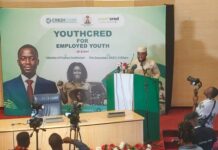Habeeb Oseni was only 27 when armed men seized him, his brother, and a close friend in Nzuda town, Damboa Local Government Area of Borno State.on 14th June 2019 — is one he will never forget.
“It was around 4:30 p.m. when they kidnapped us on our way work” Habeeb recalled. The attackers, whom locals identify as Boko Haram fighters, took him, his younger brother, Yusuf, and his friend, Ibrahim Salisu, into a forest camp.
What followed was weeks of terror. At the camp, the captors subjected them to indoctrination and military drills. They were told their only future was to become suicide bombers targeting markets and public places across Borno. Refusal meant death.
“They trained us to use weapons and threatened to kill us if we disobeyed,” Habeeb said.
Then came the breaking point. One day, they where sent out for operations and the three of them were trying to escape not knowing they are under monitoring. He could not do it. Instead, he and the others attempted to escape.
The outcome was tragic. “They caught Yusuf Oseni and Salisu Ibrahim were killed them immediately. I was the only one who managed to run into the forest, wounded and bleeding,” he said.
Habeeb eventually found his way out of Borno, first to Kwara State, and later fled Nigeria altogether. But he remains haunted, saying the jihadists are still hunting him.
The Boko Haram insurgency, now in its 15th year, has claimed tens of thousands of lives and displaced more than two million people, according to the United Nations. Rights groups say children remain among the most vulnerable, often abducted and forced into combat or used as human bombs.
For Habeeb, survival is bittersweet. “I lost my brother and my friend and also the whereabout of his parents is still whereabout till date,I will never be the same,” he said.














